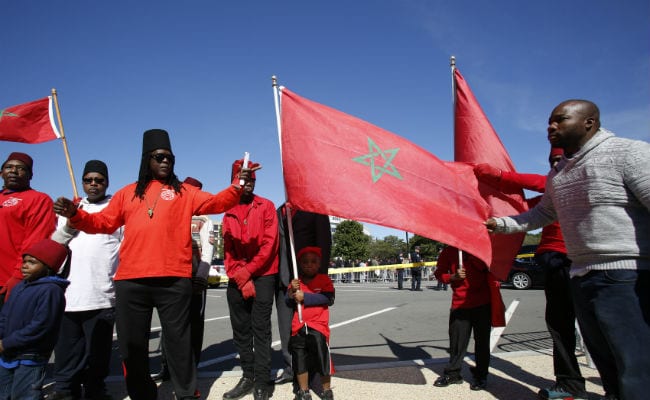
People attend the Justice or Else! rally on Capitol Hill in Washington on October 10, 2015. The rally commemorates the 20th anniversary of the Million Man March which took place on October 16, 1995. (AFP)
Washington:
Thousands of African-Americans gathered in Washington Saturday to mark the 20th anniversary of the "Million Man March," making renewed demands for justice reform and greater civil rights.
The demonstration on the National Mall - the grassy, mile-long promenade between the US Capitol building and the Washington Monument - follows a series of high-profile incidents of police violence in involving black Americans over the past year.
The anniversary event gathered people from across the United States hoping to push elected officials to do more to combat social and economic inequalities, as well as violence that disproportionately affects communities of color.
Louis Farrakhan, head of the Nation of Islam, organized both the original 1995 march and this year's "Justice or Else" gathering.
The scope of Saturday's gathering however, unlike the march 20 years ago, included a call for justice for a range of ethnic and overlooked groups.
The participants also broadened this time around, from the largely black, male crowd in 1995 to include entire families and people of other races.
"If we are denied what is rightfully due to us, then there has to be unified action that we take that will force the justice that we seek," Farrakhan told the crowd, which looked to be in the tens of thousands, from a podium near the steps of the US Capitol building Saturday.
"There must come a time when we say, enough is enough. It must change, and I am willing to do whatever it takes to bring about that change."
His message found resonance with speakers and many protesters at the rally, who invoked recent acts of alleged excessive use of police force, including some that proved deadly.
"Twenty years ago, the death of Tamir Rice would have fallen on deaf ears, left for the police to write a false report, and not broadcast for the world to know," Tamika Mallory, one of the organizers, said, referring to the police shooting last year of a 12-year-old boy in Cleveland, Ohio.
She also recalled the now infamous deaths at police hands of Michael Brown in Ferguson, Missouri, and Eric Garner in New York, which inspired the "Black Lives Matter" movement, whose slogan was omnipresent on the Mall Saturday.
Beyond the growing media attention and accountability, though, there are mixed signs of progress over the two decades since the original march.
The unemployment rate for black men in the US has remained around 8 percent since 1995, twice that of white men.
The rate at which African-Americans are arrested has declined slightly, but they remain six times more likely than whites to be detained and often face harsher sentences for comparable crimes, according to the National Association for the Advancement of Colored People (NAACP).
Barack Obama attended the original Million Man March, prior to being elected America's first black president, but the US leader was in California on Saturday.
The demonstration on the National Mall - the grassy, mile-long promenade between the US Capitol building and the Washington Monument - follows a series of high-profile incidents of police violence in involving black Americans over the past year.
The anniversary event gathered people from across the United States hoping to push elected officials to do more to combat social and economic inequalities, as well as violence that disproportionately affects communities of color.
Louis Farrakhan, head of the Nation of Islam, organized both the original 1995 march and this year's "Justice or Else" gathering.
The scope of Saturday's gathering however, unlike the march 20 years ago, included a call for justice for a range of ethnic and overlooked groups.
The participants also broadened this time around, from the largely black, male crowd in 1995 to include entire families and people of other races.
"If we are denied what is rightfully due to us, then there has to be unified action that we take that will force the justice that we seek," Farrakhan told the crowd, which looked to be in the tens of thousands, from a podium near the steps of the US Capitol building Saturday.
"There must come a time when we say, enough is enough. It must change, and I am willing to do whatever it takes to bring about that change."
His message found resonance with speakers and many protesters at the rally, who invoked recent acts of alleged excessive use of police force, including some that proved deadly.
"Twenty years ago, the death of Tamir Rice would have fallen on deaf ears, left for the police to write a false report, and not broadcast for the world to know," Tamika Mallory, one of the organizers, said, referring to the police shooting last year of a 12-year-old boy in Cleveland, Ohio.
She also recalled the now infamous deaths at police hands of Michael Brown in Ferguson, Missouri, and Eric Garner in New York, which inspired the "Black Lives Matter" movement, whose slogan was omnipresent on the Mall Saturday.
Beyond the growing media attention and accountability, though, there are mixed signs of progress over the two decades since the original march.
The unemployment rate for black men in the US has remained around 8 percent since 1995, twice that of white men.
The rate at which African-Americans are arrested has declined slightly, but they remain six times more likely than whites to be detained and often face harsher sentences for comparable crimes, according to the National Association for the Advancement of Colored People (NAACP).
Barack Obama attended the original Million Man March, prior to being elected America's first black president, but the US leader was in California on Saturday.
Track Latest News Live on NDTV.com and get news updates from India and around the world

